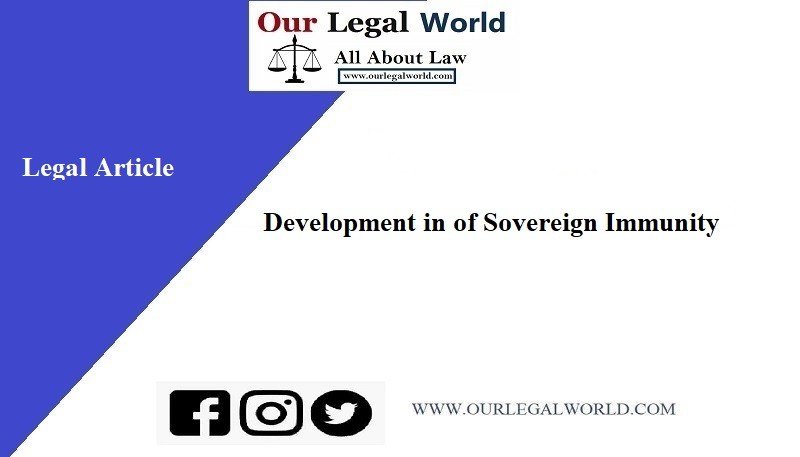Development in of Sovereign Immunity
Introduction
Legal fundamental doctrine that protects or makes any state immune from civil and criminal suits and also from any further prosecution of any kind is called sovereign immunity. Whenever state demands for nay tortious wrong that has been committed by him, and denies from paying compensation to that other state to whom the damage has been caused at that time the very common saying that “King can’t do any wrong” prevails and fit to the situation.
Save, reign immunity saves a country and its member from any actionable civil wron deems g or any criminal act. Even when the suitable elements of doing wrongs are also present in any act to be justiciable then also under this doctrine one can claim immunity and avoid the liability.
This concept got mentioned and is borrowed from the common law principle of British Principled is compared and got a resemblance to very common saying that “the king is not liable other any wrong the committed by him and even not liable for any wrong committed the by his servant”
On these similar grounds a state not be sued, for his can’t without his unsuitable doctrine of Sovereign immunity in India.
In order to provide justice to the people to whom the damage is caused, the Indian law system keeps narrowing the scope and function of Sovereign immunity. This concept was about to abolish according to the recommendation of the first law commission report. However, the bill was not passed by the parliament, so its applicability according to the need and compatibility of the Constitution.
In India, Section 86 of the Civil Procedure Code oversees the issue of remote state insusceptibility and the general guideline under Section 86 states that no outside State might be sued in any court without earlier assent from the focal government. The legislature has the carefulness to concede the assent, be that as it may, the endorsement will rely upon the particular realities of the case and would just be applied in following conditions where the remote State:
- has founded a suit in the Court against the individual craving to sue it, or
- without anyone else or another, exchanges inside the neighbourhood furthest reaches of the ward of the Court, or
- is in control of steady property arranged inside those cut-off points and is to sued concerning such property pr for cash charged subsequently, or
- has explicitly or impliedly or impliedly deferred the benefit concurred to it by this segment.
Without a different enactment, the difficult that courts regularly face is despite the fact that it is a procedural arrangement and has nothing to do with meaningful privileges of the States to sue or be sued (nonetheless, there is conceivable contention that it isn’t simply procedural however similarly considerable), it is the main way those rights can be worked out. This arrangement doesn’t reflect congruity with the current patterns in global law, which has just advanced from the situation since this arrangement was first made.
More about the article dealing with the concept of Sovereign Immunity:-Article 300.
In the beginning, there was differentiation made on the laws of principle immune of the government for the tortious act of the government for the tortuous act of its servant, it was the basis of decision between sovereign and non-sovereign immunity.
In India, no such specific provision has been made to deal with the doctrine of sovereign immunity, but in Article 300, in 1950 the state or union are made to be held liable for the specific act, of the government.
Section 178 of the government of India Act, 1935 in the origin of Article 300 of the constitution. This Article can be divided usually into major parts. First, one dealing with filing of suit and proceeding begins by one against the government is instituted.
The second part of it deals with inter alia, that a state fan sue or can be sued. For an Act of cases for which any other state or Union has already pleaded for compensation or remedy.
The third part of this Article deals with parliament and legislature of state with regards to provisions made under Article 300(1).
Types of Sovereign Immunity
There are majorly two types of Immunity.
Immunity to Jurisdiction: It would seem to be unjust for one state to fall under the jurisdiction of another. State to be called by its court. Therefore a provision has been made to make one state immune from another jurisdiction of another. Although this Immunity has been waived by the state entity. And Arbitrary dispute Resolution usually, mediation is sufficiently used for setting and waving right. Many developing countries, feel more secure for submitting arbitration under UNCITRAL rule because these are more culturally neutral than those of ICC and other Western tribunals.
Immunity from execution: The State will likewise have resistance from execution, as it would be inappropriate for the courts of one State to hold onto the property of another State. Invulnerability from execution may likewise, for the most part, be deferred.
Landmark Judgment
State of Rajasthan V. Vidyawati
This was the very first case related to this doctrine in the court of law. The facts of the cases are that a bus owned and managed by the government of Rajasthan was heading towards the place of the collector, while driving the bus driver negligently hit the paediatrician and injured him. The plaintiff filed a suit to recover the amount of loss caused to him. In the above case, as mentioned by the court that driving is not a sovereign function to drive a jeep, ignoring the defence of Sovereign immunity, the driver was held liable for the wrong that he has committed.
Kasturi Lal Ralia Ram V. State of UP
It is one of the landmark Judgement dealing with above doctrine, the facts of the cases are as a person was held liable for stealing property and some silver and gold that stolen property was assembled in a police station from where a constable stole all the silver/ gold and fled to Pakistan, it was held by the court that police officers had been negligent in carrying duty.
Also Read: RELATIONS BETWEEN THE UNION AND THE STATES- A key for development
Reference
- https://www.lawteacher.net/free-law-essays/international-law/understanding-the-doctrine-of-sovereign-immunity-international-law-essay.php.
- https://www.cambridge.org/core/journals/american-journal-of-international-law/article/economic-development-and-sovereign-immunity/EE62B4CD300F2F3111D810B8305B2B03
- https://link.springer.com/chapter/10.1007/3-540-27883-4_2.







